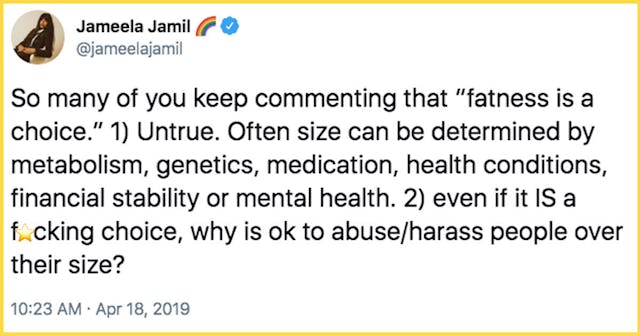Jameela Jamil Thinks Fatphobia Is Abuse, And She's Absolutely Right

She’s also encouraging people with ‘slim privilege’ to educate themselves to be more conscientious
Jameela Jamil is bringing attention to fatphobia by calling it for what it is — abuse. She’s also bringing attention to the negative way it affects women medically, mentally, emotionally, and socially in a new viral post.
“It has been so interesting to see how many slim people have taken issue with me saying that abuse of fat people should be considered as serious as abuse over sexuality or race,” she says in her latest Instagram post, which shows a series of screenshots from her Twitter account. “The statistics on medical negligence, abuse and harassment, and discrimination for work are real.”
https://twitter.com/jetpack/status/1118880565514522624https://twitter.com/jetpack/status/1118882731327229952
If you don’t think thin privilege is real, you need to take a look at the comments on this post and literally any other post where people are shamed for being overweight. Concern-trolling over someone’s fatness is about as helpful as someone telling a thin person to “eat a cheeseburger.” Fat people can be healthy, exercise regularly, have perfect blood pressure, cholesterol levels, and heart health, thankyouverymuch.
Thin privilege is simple: it exists because the entire world is meant for thin-bodied people. Clothing, public spaces, hell — even health insurance premiums! Fat people often have to pay higher rates and are shamed by medical professionals constantly. Even though “weight loss” is literally not the cure for all ailments. (Let’s not even dive into the utter scam that is the Body Mass Index.)
And Jamil gets it. When confronted by commenters who challenged her statement, she handled it expertly.
Honestly, we don’t need to get into the Suffering Olympics here (i.e. “this suffering is worse than that suffering.”) Abuse is subjective. You simply cannot know how one type of abuse affects a person versus someone else who suffered under different circumstances.
Jamil also brings up a crucial point that would behoove all of us to recognize: dehumanizing fat people is a societal ill and a tale as old as time. People think absolutely nothing of making fat jokes, commenting on fat peoples’ bodies, making “helpful” suggestions that are really just veiled insults with a side of sanctimonious thin privilege. (PSA: if you haven’t watched Shrill on Hulu yet, get on it.)
Speaking of PCOS (polycystic ovarian syndrome), I have it. When I was in the process of getting diagnosed, I vividly remember the ultrasound tech (a thin woman, natch) telling me, “You don’t have the typical body shape of someone with PCOS. I see much larger women in here, with crazy hairy stomachs.”
First of all, I am not thin. But she still felt the need to comment on other women’s bodies to me! A medical professional, making comments like that, about previous women who had been lying where I was, vulnerable, and about to get a life-altering diagnosis. One that affects everything from your body’s insulin production to your body hair, acne, weight, menstruation (or lack thereof), pain tolerance, and overall fertility. FATPHOBIA IS A THING. And it shouldn’t be — especially not in the medical field.
Many people shared their own experiences with anti-fatness and many applauded Jamil for calling it out.
https://twitter.com/jetpack/status/1118882821098102784
https://twitter.com/jetpack/status/1118920300199067651
Jamil ends her thread by thanking people for sharing their stories, because it’s not an easy thing to do. But if we keep at it, maybe — just maybe — things will change. There’s nothing “normal” about making people feel less than.